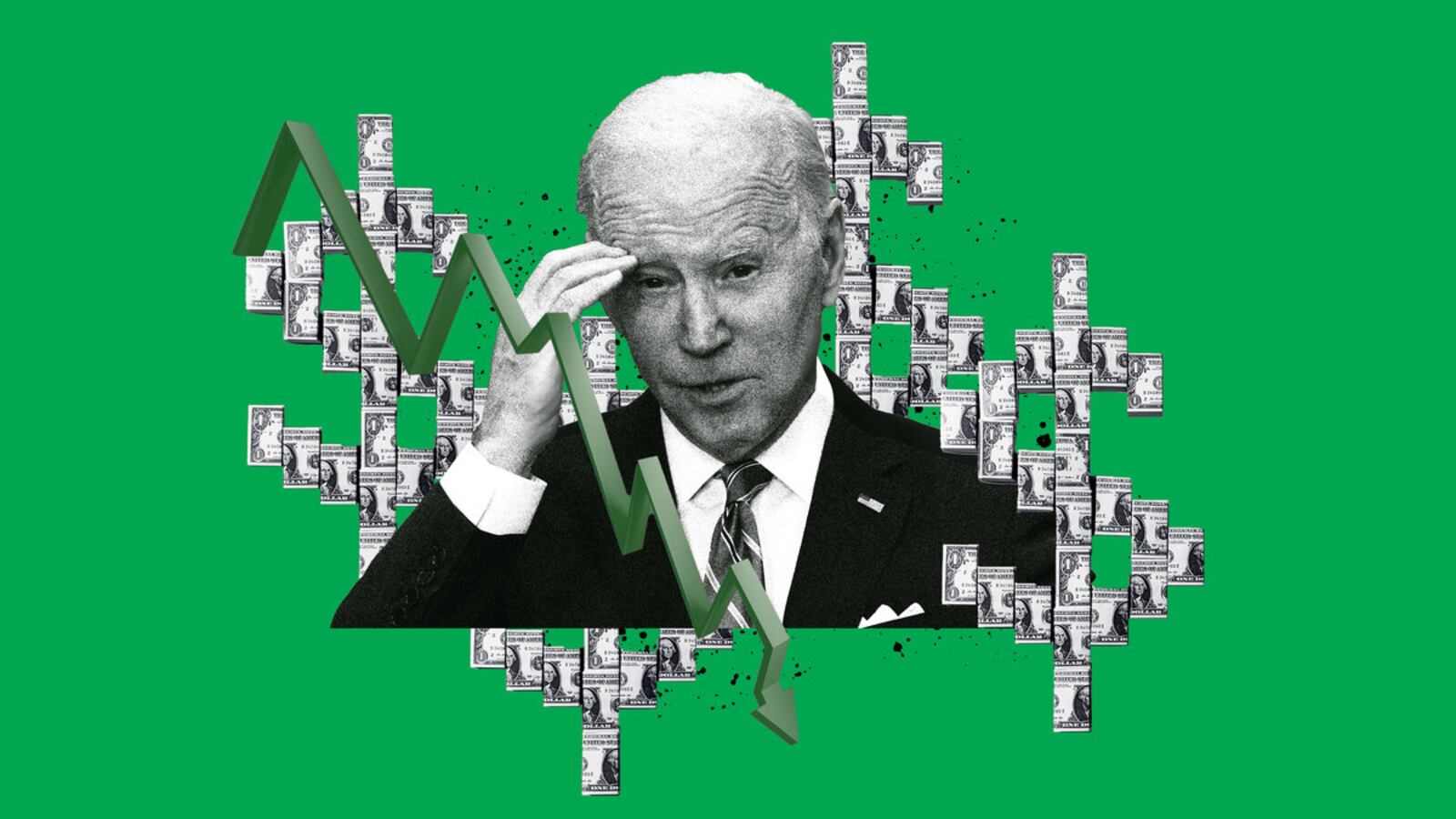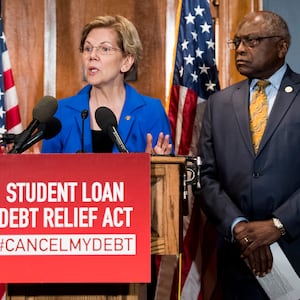President Joe Biden is considering, and likely to implement, a plan to relieve student loan debt for many Americans. Recent reports suggest he will forgive $10,000 per debt-holder.
Democrats are banking on this move to energize their base and motivate voters to show up at the polls in November. But this isn’t just bad policy, it’s bad politics.
Here are five reasons why:
1. It makes the problem worse.
The biggest proponent of bailing out loans, Democratic Sen. Elizabeth Warren, often talks about how it was so much cheaper for her to go to college in the 1960s, but her solution would make things exponentially worse for the generation ahead.
Universities are raising the cost of tuition to a degree that is becoming nearly unattainable without generous assistance. But bailing out student loans without addressing the root cause of the problem is just bad governance. Banks will raise rates, colleges will raise tuitions, all with the knowledge that the next unified Democratic government will bail the system out again.
And it’s not like universities are poor. Harvard stands above all its competitors with a $53 billion endowment, but even the State University of New York at Buffalo is sitting on $1 billion.
Private and public institutions are making it harder to afford their product, while sitting on gold mines. Nothing in this bailout will incentivize them to reduce costs. In fact, it’s the opposite. Costs will go up, knowing they are likely guaranteed by future executive action, and higher learning will be placed even further out of reach for working-class families.
In turn, young borrowers will feel emboldened to take out loans that may be out of the scope of their potential future earnings. And why wouldn’t they? If a student loan bailout happens now, there’s always the hope that they too will benefit from a bailout in the future.
By excusing the lending of the past, we will encourage more irresponsible lending in the present and future.
2. It makes little political sense.
With President Biden languishing in low approval numbers, a stagnant Congress, and facing awful midterm election prospects—Democrats are looking for a Hail Mary to bolster their chances in November. But sweeping debt amnesty will make matters worse for them.
Democrats have a problem winning college-educated suburbanites, as Virginia’s off-year gubernatorial election demonstrated. But they have a much bigger problem with the non-college-educated masses that were once a bedrock of the Democratic base.
In a recent NPR/Marist poll, they held a 12-point advantage with college-educated voters, but a 14-point deficit with those who did not attend college. A minority of the public support some measure of forgiveness, but even those people are bifurcated in smaller groups—depending on whether student loan amnesty would be means tested, or just a bailout for everyone (including the well-off).

Democrats asking truck drivers to pay off the loans of college graduates—in order to maybe move those numbers a percentage point or two in a favorable direction for Democrats—only distances them from the party’s working class roots.
Biden’s biggest political problem in November will be inflation, as he presides over historic increases in the price of goods and services unseen since Jimmy Carter was president.
Much of this is fueled by the historic government spending in response to the COVID-19 pandemic, which certainly could exacerbate inflation. Giving the markets six months before the election to react to this move is likely to backfire and make voters even more nervous about their financial future. When inflation is motivating your political choices, any signal that it is getting or will get worse is bad politics.
3. Biden doesn’t have the power.
The current trial balloon floating in the political winds would have President Biden forgive $10,000 of student loans—without means testing the aid.
That proposal would net out at over $400 billion. To put that in perspective, the Congress is currently debating a $30 billion aid package to Ukraine to fight Russia.
Presidents should have to face the scrutiny of Congress to spend nearly a half trillion taxpayer dollars. The Constitution clearly gives them the power of the purse, even if members like Rep. Alexandria Ocasio-Cortez are willing to cede their own authority.

Sen. Joe Manchin—so reviled among progressives for blocking Biden’s enormously expensive Build Back Better spending package—has said his issue with Biden’s legislative agenda is that it spent far too much during inflationary times. This executive action all but admits that Congress would not support this plan if put to a vote.
This proposal will also face enormous legal scrutiny and challenges, which are likely to create havoc within the lending market, as banks and lenders try to sort out the outcome. Incoming college students over the next two years will face a tumultuous situation—uncertain about how exactly they’ll finance their own degrees.
4. It’s unfair.
Proponents like AOC point to other federal programs that redistribute wealth to make the case that canceling student loan debt would be a perfectly normal function of government. But the programs they point to—like Medicare, Social Security and housing programs—are not built on choices.
You can’t help being old or in many cases, poor. College loans, however, are taken out by willing adults (and often their willing adult parents) on a gamble that it will accelerate their earnings down the road.
This gamble often pays off. College-educated adults earn at least double what their counterparts make in the workforce. Aside from the earning potential, there are other choices made along the way. Whether parents sacrificed to save, or whether students chose to take different paths based on income—choices were made in a transparent system.

I personally took advantage of night classes and part-time instruction to afford my degree. Many choose commuter colleges or forgo their passion for a degree that will pay more down the road. If you fully paid for your college education before or after this bailout, you may have a certain bitterness that a politically opportune moment benefited some—while leaving you eating ramen to pay for someone’s degree in ancient Greek.
Further, college isn’t for everyone. But an endlessly running student loan spigot makes it seem like only a fool would pass up higher education.
On the contrary, we should be encouraging more people to embrace trades and vocational education—without the assigned shame that it isn’t at the same level as an Ivy League philosophy degree.
5. It’s regressive.
Many supporters say student loan debt amnesty will help low-earning adults. It’s true that some will benefit—but to a much smaller degree than those doing quite ok, financially.
According to the Brookings Institution, the vast majority of student debt is held by the highest earners. The lowest-earning 40 percent of households hold less than 20 percent of the outstanding student debt.
This isn’t a program to help those in need pull themselves up by their bootstraps, but is instead a giveaway to people who have accelerated past them in the workforce. Democrats are actually proposing to tax the middle class in order to pay for someone’s “The Sociology of Miley Cyrus” class (that’s a real thing) and say it’s in the name of equity.

College students make choices, and if their choices don’t bring the outcomes for which they’d hoped, this is a terrible way to incentivize better choices. There are cheaper ways to help the lower-income households of America with existing congressionally authorized programs—and without giving $10,000 to people earning six-figure salaries.
Going full-Bernie Sanders would be a bad political move for Biden in a midterm year in which he’s cratering with the center and independents. But it’s also bad policy.

If Democrats want to go down this path, they should commit to doing so only after we’ve first debated and instituted reforms to reduce the cost of college, and created mechanisms to force colleges that accept federal assistance to comply.
And colleges must be willing to acknowledge their role in creating more access and affordability and commit to that path. By helping solve this problem for future generations, you would have significantly more permission to address those harmed by it in the past.








